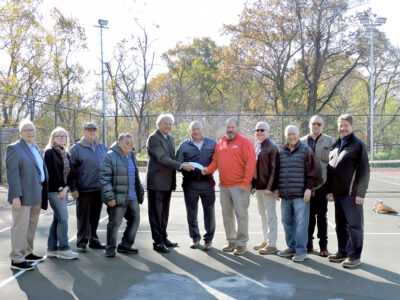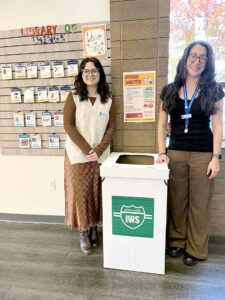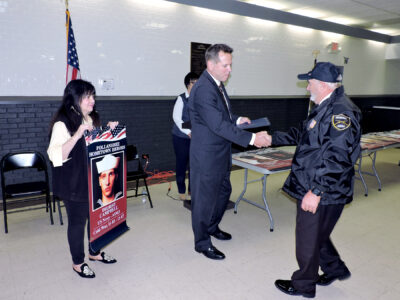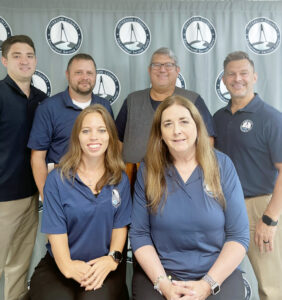Virtual Learning Academy to present at conference
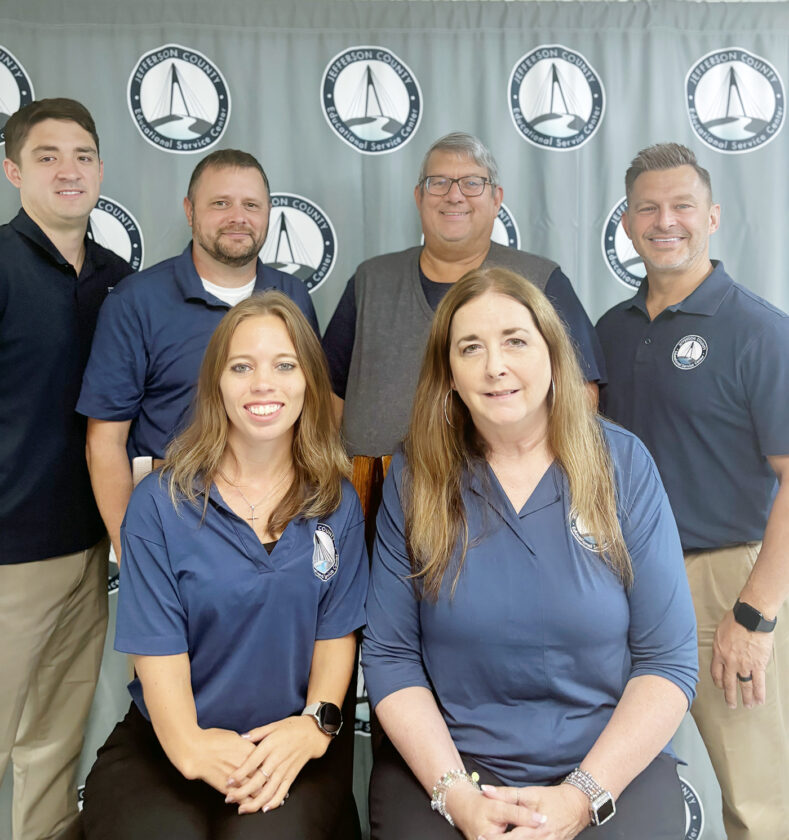
READY FOR CONFERNCE — The Jefferson County Educational Service Center Virtual Learning Academy will share its expertise in a statewide venue during a presentation at the Ohio School Boards Association’s 70th-annual Capital Conference. Preparing are, from left, front, Martariesa Logue and Patty Ferrell; and back, Cody Westling, David Moore, Director Mark Masloski and Brant Starkey. -- Contributed
STEUBENVILLE — The Jefferson County Educational Service Center is leading the way in delivering accessible education with responsive service. The JCESC Virtual Learning Academy will be addressing new developments in education with two presentations during the Ohio School Boards Association’s 70th-annual Capital Conference Nov. 16-19 in Columbus.
Director Mark Masloski will share his and his staff’s expertise with “How ESCs Enhance Virtual Learning Success” from 12:30 p.m. to 12:40 p.m. on Nov. 17. The session will explore the role of educational service centers in supporting school districts through virtual learning solutions.
Masloski will highlight strategies for improving student engagement, accessibility and sustained instructional support, showcasing how ESCs help districts meet the evolving needs of today’s learners.
Later that day, from 4 p.m. to 5 p.m., he and Assistant Director Martariesa Logue will present “From Data to Decisions: Mastering ODEW Compliance,” directed at helping school administrators and district leaders navigate Ohio Department of Education and Workforce reporting requirements. This talk will delve into best practices for accurate reporting, strategies to avoid common compliance pitfalls and how to leverage educational data to both meet mandates and drive meaningful, data-informed decisions at the district level.
Masloski said school board members, superintendents and treasurers from across the state will be in attendance.
“Every area of Ohio will be represented,” he explained
He added JCESC has been an integral part of the conference for more than a decade.
The VLA program itself has kept pace with the evolving educational landscape and adapts its services.
“One of our prime focuses is the online curriculum and making sure that we’re meeting the needs of the schools today,” Masloski said. “Just letting everybody know the variety of things that we’re able to do, and also letting them know how important this mission in education is to be effective in a timely manner.”
One of VLA’s features is a fast response to clients. When VLA staff members get an e-mail about a student or educator having technical difficulties, the priority is finding a solution.
“When situations happen, things need to be improved or fixed. Not down the road, but within hours or within a day,” Masloski said.
He said VLA is also prioritizing ensuring the credibility of curriculum and the students’ own work, particularly in an age of artificial intelligence.
“Making sure we’re able to get the most authentic responses from our students as possible.”
Logue said they check for critical thinking by providing opportunities for students to demonstrate their comprehension of the material when writing their essays.
“We ask the students for their opinion instead of asking for facts, then following up,” she said.
Masloski added VLA also works closely with the students’ coaches and mentors and offers strategies. He anticipates many questions about how to detect AI-generated material during the conference.
Brant Starkey, a member of the VLA staff, said many of the learning gaps can be closed by reminding students to fully read the lesson rather than turning to AI. He said the information they need to answer the questions is contained within the content.
“Students are starting to use it when they’re complicating it for themselves,” he said.
Masloski said VLA is adding offline and application activities.
“There are going to be tables and graphs where they can type the answer in the content itself, not in the assessment part,” he said. “As these kids are growing and coming into a virtual world, we need to be able to provide how they’re going to be able to apply the information that they learned. Being able to provide cross-categorical things. If they’re learning some science, how can they apply it to their everyday life?”
VLA staff also works with schools to help educators follow the curriculum and deepen student involvement.
David Moore, a staff member, agreed that VLA has not rested on its laurels.
“We’re always striving to make our content better, year in and year out. We’re always working on upgrading and making a better experience for the students.”
The day’s topics will include ensuring student privacy by making certain student information is not shared.
VLA is also offering more client services. VLA makes use of NextUp curriculum, which provides educators with transition curriculum, tools and resources to prepare students for employment.
Masloski said cooperation between schools will likely be more prevalent in the future.
“As an educational service center, we’re here to help and support all schools. How can we do this in an efficient way? There might be a lot more partnerships for schools now. I think that’s going to be a key.”
Masloski and Logue emphasized the role of JCESC in providing guidance and support to member districts. JCESC VLA serves multiple schools in Ohio and beyond.
“We try to do all the legwork for them so they all they need to do is concentrate on the student and themselves. We do that with a professional development team,” Masloski said JCESC’s services extend to marketing. “They’re able to promote things that we’re doing.”
Logue said the student-centered approach characterizes VLA. Masloski said the human element is as important as technological acumen. The respect and professionalism of the staff means clients are comfortable coming back and asking more questions.
Masloski said VLA hosts webinars for all of the vendors JCESC works with.
“VLA not only partners with school districts but also with alternative schools, detention centers, and individual families who purchase VLA as part of their homeschool curriculum.”
Upcoming live webinars are scheduled for Oct 30, featuring Mark Bobo, director of communication services of the Ohio School Boards Association; Nov. 20, featuring Kailey Rinehart, a school partnership associate with Edpuzzle; and Jan. 29, featuring Hunter Dewey, sales development representative with Britannica Education.
Located in the R. Larry George Training Annex at 1913 Estelle Ave., Steubenville, the VLA serves all students, including those who are credit deficient, homebound or home schooled. JCESC VLA can serve as a stand-alone program or implemented within a district’s existing curriculum.

